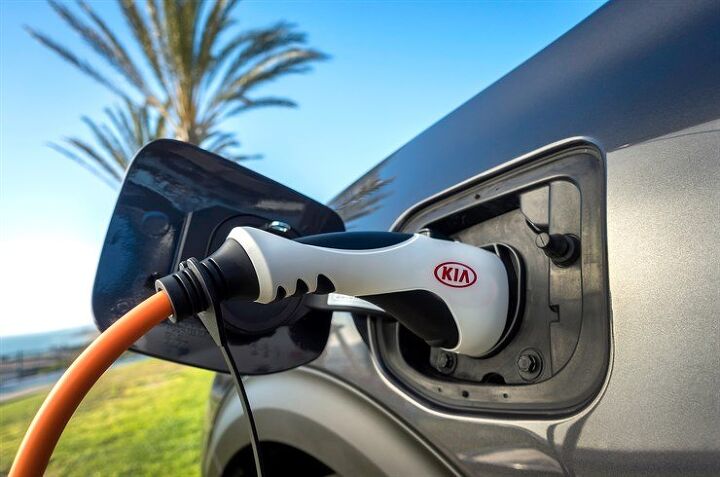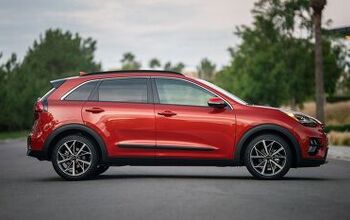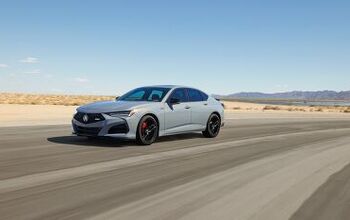In the Hot Seat: Kia Niro Hybrid Recalled Over Fire Risk

Kia will be recalling 27,000 Niro hybrids sold within the United States due a potential defect in its wiring relay that could potentially send the rear seats up in smoke. According to filings with National Highway Traffic Safety Administration, Kia reported a few warranty claims involving burn or heat damage to the rear seats. There was also at least one customer complaint alleging that the rear seat actually caught fire.
Affected units are said to come from the 2017 and 2018 model years. The main relay located beneath the rear seats is believed to have poor connections between its contacts on some vehicles. This results in increased electrical resistance and heat. In a worst-case scenario, a fire is totally possible.
Possible warning signs include dashboard alerts and a vehicle that suddenly has trouble starting. We’d also imagine a weird burning smell could be indicative of a fast-approaching issue. Consumer filings with the NHTSA have been limited to the single digits, however Car and Driver reported that the issue could be more severe on Tuesday, as did we.
From Car and Driver:
Separately, numerous owner complaints reviewed by the Center for Auto Safety and Sen. Bill Nelson (D-Florida) indicate that some Hyundai and Kia models may pose a fire risk. The Ralph Nader–backed nonprofit has said it has reviewed “at least” 161 complaints of fires that allegedly started without a collision and quotes owners as reporting “melted wires in the engine bay, smoke, and burning odors.” The group filed a formal petition to the National Highway Traffic Safety Administration (NHTSA) this summer, requesting an investigation regarding the 2011–2014 Kia Optima and Sorento and Hyundai Sonata and Santa Fe models, many of which were recalled in 2015 and 2017 for engine seizures. NHTSA has not formally opened an investigation into these vehicles for fires but is investigating the original recalls, which covered more than 1.6 million cars, as part of an audit. As of June, Sen. Nelson reported at least 23 “spontaneous fires in Florida” involving Hyundai and Kia models since 2014, including one in May that involved a 2012 Sorento that caught fire on the highway. The Center for Auto Safety also reports that NHTSA’s database shows 23 reports of non-collision-related fires in 2010–2015 Kia Soul models and calls the figure “concerning.”
As worrying as that may be, wiring-related recalls seem to be growing in popularity across the industry. In January, Hyundai recalled 88,000 Sonatas from the 2006 model year and 2006-2011 Azeras to prevent engine compartment fires. That issue stemmed from an electrical short in the anti-lock braking system’s control module, and not an under-the-seat battery relay. Regardless, it was small potatoes compared to some of the other problems from the last 12 months.
BMW announced it was recalling nearly one million cars and SUVs in North America in November of 2017. Over half of those involved wiring corrosion on the 3-series from 2006-2011. Meanwhile, FCA recalled almost 6 million units this year to fix a short-circuit risk that could make it impossible to disengage cruise control.
Kia is estimating that only 1 percent of the at-risk Niro hybrids are affected but intends to launch the widespread recall to ensure it gets them all. Dealership will pull out the rear seat to take a gander and do what needs to be done. The automaker intends on replacing the entire relay if it’s undamaged and will also repair any potential damages created by a defective unit free of charge. Owners of affected Niros should be notified via mail in late November — once Kia has enough replacement parts to begin repairing all the vehicles.
[Images: Kia]

A staunch consumer advocate tracking industry trends and regulation. Before joining TTAC, Matt spent a decade working for marketing and research firms based in NYC. Clients included several of the world’s largest automakers, global tire brands, and aftermarket part suppliers. Dissatisfied with the corporate world and resentful of having to wear suits everyday, he pivoted to writing about cars. Since then, that man has become an ardent supporter of the right-to-repair movement, been interviewed on the auto industry by national radio broadcasts, driven more rental cars than anyone ever should, participated in amateur rallying events, and received the requisite minimum training as sanctioned by the SCCA. Handy with a wrench, Matt grew up surrounded by Detroit auto workers and managed to get a pizza delivery job before he was legally eligible. He later found himself driving box trucks through Manhattan, guaranteeing future sympathy for actual truckers. He continues to conduct research pertaining to the automotive sector as an independent contractor and has since moved back to his native Michigan, closer to where the cars are born. A contrarian, Matt claims to prefer understeer — stating that front and all-wheel drive vehicles cater best to his driving style.
More by Matt Posky
Latest Car Reviews
Read moreLatest Product Reviews
Read moreRecent Comments
- Ltcmgm78 Just what we need to do: add more EVs that require a charging station! We own a Volt. We charge at home. We bought the Volt off-lease. We're retired and can do all our daily errands without burning any gasoline. For us this works, but we no longer have a work commute.
- Michael S6 Given the choice between the Hornet R/T and the Alfa, I'd pick an Uber.
- Michael S6 Nissan seems to be doing well at the low end of the market with their small cars and cuv. Competitiveness evaporates as you move up to larger size cars and suvs.
- Cprescott As long as they infest their products with CVT's, there is no reason to buy their products. Nissan's execution of CVT's is lackluster on a good day - not dependable and bad in experience of use. The brand has become like Mitsubishi - will sell to anyone with a pulse to get financed.
- Lorenzo I'd like to believe, I want to believe, having had good FoMoCo vehicles - my aunt's old 1956 Fairlane, 1963 Falcon, 1968 Montego - but if Jim Farley is saying it, I can't believe it. It's been said that he goes with whatever the last person he talked to suggested. That's not the kind of guy you want running a $180 billion dollar company.




































Comments
Join the conversation
Serious question/comment here: *All* Niros are hybrids (except the mythical Niro EV on its way), but the photo shows a plug, indicating a Niro Plug-in Hybrid. Does this recall affect the plug-in version, the standard hybrid version, or all Niros?
This is why I'm not an early adopter. Any time a maker puts this much new tech in a vehicle, I avoid the first model year or two. The Ford C-Max was a recall queen in it's first year, 2013, but by the time I got my 2017, it they'd had tome to work the bigs out and even CR was recommending them.